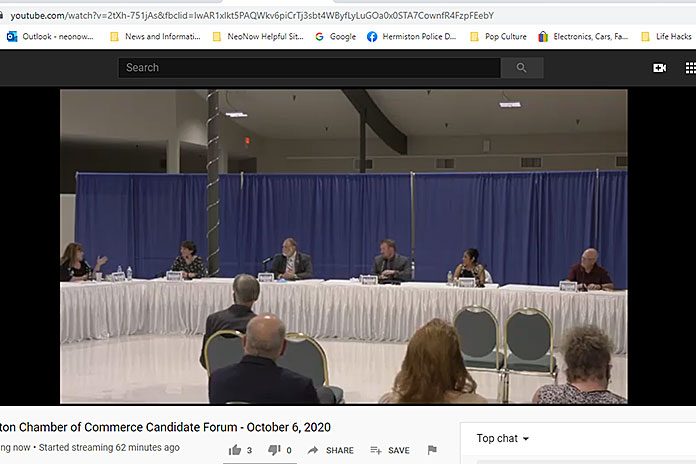
The five candidates running for the four at-large Hermiston City Council seats shared their views on a variety of topics Tuesday night, ranging from future growth to homelessness.
The Hermiston Chamber of Commerce and KOHU/The Q hosted the event at the Hermiston Community Center and Angela Pursel served as moderator. The forum was also streamed on YouTube.
Those vying for the votes of Hermiston residents are current Councilors Rod Hardin, Doug Primmer and David McCarthy, as well as Maria Durón and Nancy Peterson.
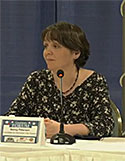
The candidates were asked what areas they would like to see resources spent on. Peterson, who is an education accessibility specialist, said she would like to see the city reach out to schools, parents and children during the coronavirus pandemic to see if there is any assistance that can be provided.
“Some parents are not used to the new technology being used with distance learning,” she said. “Is there anything we can do to support the families so the parents can continue to work while the children are in school?”
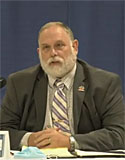
Primmer said the city’s biggest asset is water and the council should continue to invest to create more opportunities for growth.
“The more water that is available, the more business, ag and industrial development we can do,” he said.
McCarthy said he’d like to see more money put into increasing visibility in high-traffic areas.
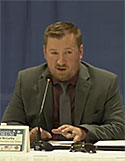
“I’d like to see us provide safer pathways and sufficient lighting,” he said, adding that he has heard residents talk of “treacherous streets.”
Durón said more outreach to the Hispanic community is needed, particularly in times of emergencies such as the recent fire this past summer. She noted that there wasn’t any emergency alerts in Spanish.
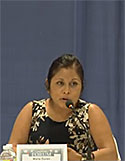
Hardin said transportation is key, highlighting the city’s agreement with Kayak Public Transit to provide free bus service in town, as well as the city’s West-End Workforce On-Demand Ride Cooperative that provides low-cost rides to work for area employees.
“I think it needs to be expanded,” said Hardin.
On the issue of homelessness in Hermiston, the five candidates all voiced concern about the issue, but the nature of their concerns varied.
Primmer said he worries that creating a full-time shelter will only make the issue worse.
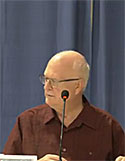
“We need to balance the needs of others in the community,” he said. “I don’t want to create a destination for the homeless or a dumping point.”
Peterson spoke from personal experience, pointing out that she had, at one time, been homeless for three months. She supports the idea of the city providing a shelter for people with nowhere to go.
“We need to stop talking about ‘those homeless people’ and start talking about us and make it more personal,” she said. “Right now, people are a paycheck or two away from being homeless. Getting a job requires and address.”
Hardin said the biggest challenge facing the city is finding an appropriate location.
Durón also said the issue needs to be addressed by the city.
“I’ve volunteered at the Warming Station where we can have 12-15 families at a time,” she said. She said the city should work with the state to find out what resources are available to communities dealing with the issue.
McCarthy, too, said the city needs to get involved.
“I think it’s in the city’s best interest to provide some location for the homeless to be safe,” he said. “And there needs to be services so they can learn skills, get a job and contribute to the community.”
Pursel asked each of the candidates what can be done to get citizens more informed and involved in city issues and how can the council do better in getting and incorporating public feedback.
Durón said the solution is easy.
“Listen,” she said. “You have to listen to people and what their concerns are.”
Primmer agreed. “We serve the people,” he said. “We have to listen to what people say. If you don’t listen, you’re not going to be effective.”
Hardin, like others, said an effort needs to be made to get people to participate on city committees.
“We have something like 16 vacancies on our committees,” he said. “The more people get involved and understand what’s going on, the better.”
Peterson said the city needs to make a better effort to reach out to all citizens.
“You need to go where the diversity is,” she said, adding that information can’t just be put out in the same outlets. Otherwise, the city is missing a wide swath of residents. “We have a broad group of people in this city and we need to reach out to where they are.”
McCarthy urged more citizens to attend Hermiston City Council work sessions where detailed discussion takes place on issues prior to the council voting on a given matter.
“If there’s an issue you care about, pay more attention to what’s on the council agenda, he said.
The candidates were also asked what they think is the biggest issue facing the city in the next five years.
Hardin said quality of life issues will be a focus and pointed out the construction of the new Funland Playground and the need for a skate park in town.
“We have money set aside for a skate park,” he said. “It’s been in the plans for years.”
Peterson said the city needs to continue to focus on growth and said she is encouraged by the community’s optimism for growth.
Primmer said the city must be ready to deal with changes that will come in the community.
“Things change constantly,” he said. “How we deal with that will be a challenge because there is so much diverseness these days.”
Durón said growth and infrastructure will continue to be front and center.
“We are looking at aging infrastructure which has led to higher water rates,” she said. “Let’s look to see how other cities have dealt with these issues.”
McCarthy said the immediate challenge will be how the city comes out of the pandemic and what the new “normal” will look like.
“We may have been ill-prepared,” he said, noting that many essential services weren’t readily available to people facing a crisis.
“We need to find ways of making services more accessible,” he said.








